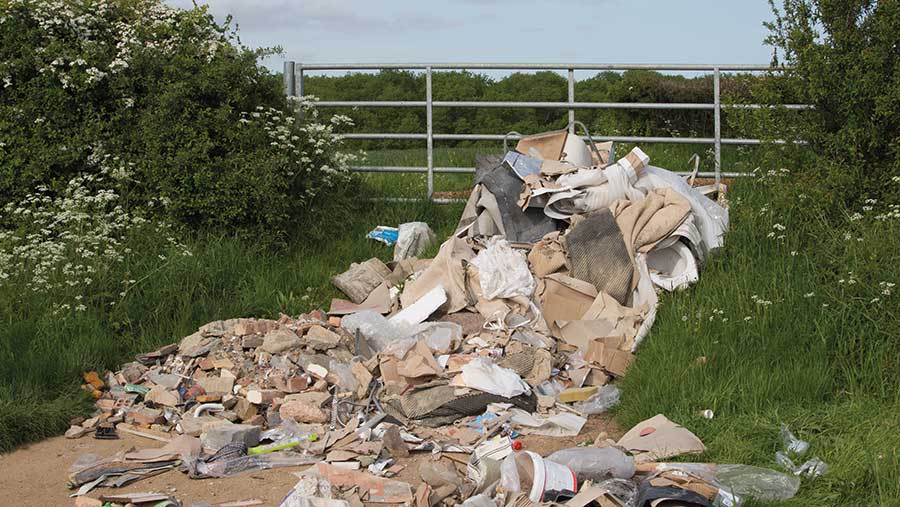Business Clinic: Does insurance cover costs of fly-tipping?
 © Tim Scrivener
© Tim Scrivener Whether it’s a legal, tax, insurance, management or land issue, Farmers Weekly’s experts can help.
Tim Slinger of insurance broker A-Plan Rural advises on responsibility for clearing up, prosecuting and the insurance aspects of fly tipping.
See also: Business Clinic: who insures farm building projects?
Q: We have been lucky not to have been too badly affected by fly-tipping in our area so far. However, a few local incidents have made me question whether farm insurance covers this and, if yes, is this standard and what is covered?
For example, while getting rid of the dumped material would be one cost, there could also be contamination, depending on the material.
A: Farmer victims of fly-tipping are more than aware how painful it is to have to pay to clear up other people’s mess and cope with the operational fallout.
The latest stats
A recent national waste crime survey by the Environment Agency revealed that dumped waste becoming a “visual blight or eyesore” disproportionately affected farmers, with 90% of respondents reporting having been affected.
In addition, 55% of respondents said that fly-tipping had worsened over the past 12 months, when Covid lockdowns and tip closures fuelled a home improvement boom and created more waste. Some 62% said Covid had led to an increase in waste crime.
Fly-tipping cover
In terms of insurance, you should discuss fly-tipping with your broker before taking out a policy. Some farm policies offer a small amount of cover as standard, typically only a few thousand pounds.
But you could be faced with much higher clearance costs, especially for serious waste dumping offences.
More comprehensive farm and estate insurance policies are available, which can include, for example, up to £25,000 protection for fly-tipping as standard without any additional charge.
This covers the cost of clearing up and removing any materials resulting from a waste dumping incident out of your control, including pollution, contamination, and environmental damage.
When to make a claim
Before making a claim, check it is you who is responsible for the clear-up operation – this is dependent on where the fly-tipping incident occurred.
For small-scale fly-tipping on public land, including public highways where the rubbish might block a road or your farm entrance, local authorities are responsible for investigating, clearing the waste and taking appropriate enforcement action. So, you should alert the local council.
For larger scale offences (more than a lorry load), hazardous waste or fly-tipping by organised gangs, in England the Environment Agency (EA) is responsible.
You are only personally responsible for clearing fly-tipped waste if it occurs on your own private land, so that’s when to make an insurance claim, so long as you have the correct cover in place, of course.
It would be wise to report a tip if there is potential to apprehend offenders or if there is hazardous or contaminated waste.
Ways to protect your farm against fly-tippers
Of course, rather than having to sort out an incidence of fly-tipping, it is far better to prevent incidents in the first place, so here are some tips:
- Ensure gates remain closed and locked
- Block unused access routes and gateways
- Use WhatsApp groups to keep employees and other rural businesses in the area updated on suspicious activity
- Stay in touch with local police, especially if they have a rural team
- Set up CCTV as a deterrent and to help catch waste criminals.
If you fall victim to fly-tipping but can prove who is responsible, penalties include fines under the Environmental Protection Act, fixed penalty notices and vehicle seizure.
Householders can be fined up to £400 if they pass waste to an unlicensed waste carrier, which is then fly-tipped.
Do you have a question for the panel?
Outline your legal, tax, finance, insurance or farm management question in no more than 350 words and Farmers Weekly will put it to a member of the panel. Please give as much information as possible.
Email your question to FW-Businessclinic@markallengroup.com using the subject line “Business Clinic”.
